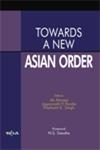Asian States in Crisis
Problems common to many Asian states suggest a pattern of crisis in Asia. The evidence suggests that the root cause is the similarity in the patterns of political development of postcolonial states. In Asia such states have attempted to reconcile state strength and internal diversity by constructing a triangular balance between identity construction, hegemonic governance and economic development. Unfortunately, this fragile balance eroded as state structures matured and economies grew, which increasingly exposed countries to escalating crises of legitimacy and instability.
- Björn Dressel , Michael Wesley
- July 2014







